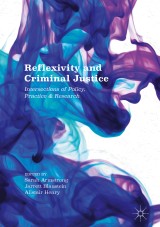Details

Reflexivity and Criminal Justice
Intersections of Policy, Practice and Research|
117,69 € |
|
| Verlag: | Palgrave Macmillan |
| Format: | |
| Veröffentl.: | 23.11.2016 |
| ISBN/EAN: | 9781137546425 |
| Sprache: | englisch |
Dieses eBook enthält ein Wasserzeichen.
Beschreibungen
<div>This collection presents a diverse set of case studies and theoretical reflections on how criminologists engage with practitioners and policy makers while undertaking research. The contributions to this volume highlight both the challenges and opportunities associated with doing criminological research in a reflexive and collaborative manner. They further examine the ethical and practical implications of the ‘impact’ agenda in the higher education sector with respect to the production and the dissemination of criminological knowledge. </div><div><br></div><div>Developed to serve as an internationally accessible reference volume for scholars, practitioners and postgraduate criminology students, this book responds to the awareness that criminology as a discipline increasingly encompasses not only the study of crime, but also the agencies, process and structures that regulate it. Key questions include: How can criminal justice policy be studied as part of the field of criminology? How do we account for our own roles as researchers who are a part of the policy process? What factors and dynamics influence, hinder and facilitate ‘good policy’?</div><div><br></div>
<div>1. Impact and the Reflexive Imperative in Criminal Justice Policy, Practice and Research; Sarah Armstrong, Jarrett Blaustein, Alistair Henry.- 2. Interpreting Influence; Harry Annison.- 3. When the Stars Align; Elaine Fishwick.- 4. Towards Hope, Solidarity and Re-Humanisation; Ruari-Santiago McBride.- 5. Policy as a Crime Scene; Sarah Armstrong, Anita Lam.- 6. Reflexivity in Statistics as Sociology of Quantification; Bilel Benbouzid.- 7. Criminological Knowledge and the Politics of Impact; Lesley McAra.- 8. Reflexive Academic-Practitioner Collaboration with the Police; Alistair Henry.- 9. The Shifting Legitimacy of Knowledge across Academic and Police/Practitioner Settings; Karen Lumsden.- 10. The Politics of Establishing Reflexivity as a Core Component of Good Policing; Dominic A. Wood, Emma Williams.- 11. Getting in, Getting out and Getting Back; Mary Bosworth, Blerina Kellezi.- 12. Cartel Biographies; Christopher Harding.- 13. Who Needs Evidence?; Graham Ellison.- 14. Insider? Outsider?; Kelly J. Stockdale.- 15. Situated Perspectives on the Global Fight against Torture; Andrew M. Jefferson.- 16. Ethical Criminologists Fly Economy; Jarrett Blaustein.- </div><div><br></div>
<div>Sarah Armstrong is a Senior Research Fellow in Sociology at the University of Glasgow. She is widely published and her research focuses on prisons, policy and culture.</div><div> </div><div>Jarrett Blaustein is a Lecturer in Criminology at Monash University. His research focuses on intersections between policing and international development.</div><div> </div><div>Alistair Henry is Senior Lecturer in Criminology at the University of Edinburgh and Associate Director of the Scottish Institute for Police Research. His research focuses on policing and security, community safety, and the sociology of organizations. </div><div><br></div>
<div>This collection presents a diverse set of case studies and theoretical reflections on how criminologists engage with practitioners and policy makers while undertaking research. The contributions to this volume highlight both the challenges and opportunities associated with doing criminological research in a reflexive and collaborative manner. They further examine the ethical and practical implications of the ‘impact’ agenda in the higher education sector with respect to the production and the dissemination of criminological knowledge. </div><div><br></div><div>Developed to serve as an internationally accessible reference volume for scholars, practitioners and postgraduate criminology students, this book responds to the awareness that criminology as a discipline increasingly encompasses not only the study of crime, but also the agencies, process and structures that regulate it. Key questions include: How can criminal justice policy be studied as part of the field of criminology? How do we account for our own roles as researchers who are a part of the policy process? What factors and dynamics influence, hinder and facilitate ‘good policy’?</div><div><br></div>
Draws on a diverse range of critical case studies Addresses key questions about criminological knowledge dissemination Examines the impact of criminology on Higher Education

















